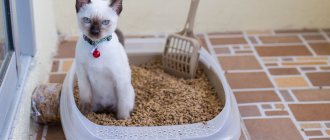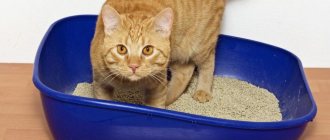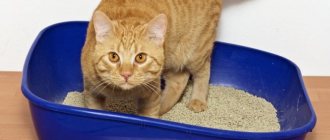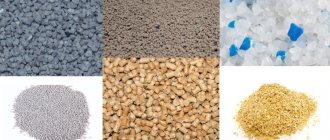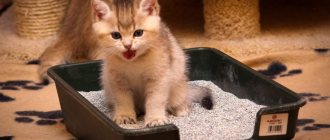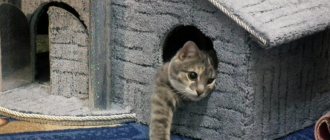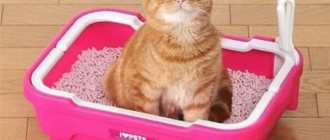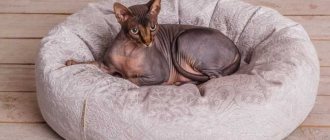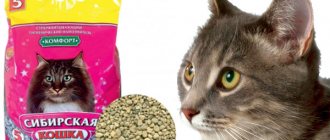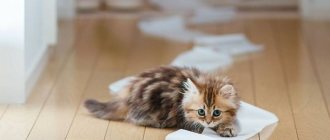To ensure that the place where the cat relieves itself is clean, and the animal itself is tidy, the owner needs to choose the right cat litter. The soil can be wood, clay, silica gel, paper, corn, grass, which is produced by many manufacturers. The owner should know all the advantages and disadvantages of hygienic sand and the features of its choice.
According to veterinarians, cat litter should be selected individually based on the pet’s habits and preferences; however, silica gel is considered one of the best options for an adult cat, but it is dangerous for kittens.
Inexpensive and convenient way to fill cat litter
Having brought home a kitten, the question of the toilet immediately arises.
For all cats living in apartments, this is a tray. But the tray needs filler. And here the question arises about choosing a filler. The choice of fillers is so huge that it is difficult to navigate. There are also expensive clumping, simple mineral and cheap fillers made from pressed sawdust. Which one to choose is up to the animal owner. But all fillers are expected to absorb moisture well, completely absorb odor and, most importantly, to please the animal.
Expensive cat litter is not affordable for everyone. Clumping, expensive products are not always liked by animals, and are sometimes even dangerous for them. In veterinary medicine, there are many cases where small kittens ate a little of this filler, which led to serious complications and diseases of the digestive system.
Mineral fillers are cheap, but do not cope with odor. Which makes them less in demand. Compacted sawdust litter does an excellent job of eliminating odor and moisture, but cats can easily spill it out of the litter box when raking it. In addition, sawdust sticks to the paws, and this spreads throughout the apartment.
We offer a solution to this issue, which will allow you to significantly save on fillers, completely isolates the smell, and the tray can be changed no more than once a week. All you have to do is remove the solid fragments every day and that’s it!
Let's take pressed sawdust, which copes so well with odor and moisture, and pour it into the bottom of the tray. You need very little sawdust, since when absorbed they will increase significantly in size.
We will place a grate with mineral filler on top. It passes moisture through itself, and the sawdust absorbs it and neutralizes it. In addition, all cats like the mineral filling; it does not spread on its paws throughout the apartment, does not stick to the animal’s fur and, apparently, is very pleasant to rake.
The proposed method will save a lot of money. Housewives will not be horrified by the torn up contents of the cat litter, and guests will never smell an unpleasant odor.
So, if your cat can’t get used to the toilet, she may simply not like its contents.
Source
Types of litter for cats
To select a good composition, it is necessary to take into account its compliance with several requirements. It is important that it has excellent absorbent properties and is safe for animals and humans. Another significant requirement is convenience and ease of use. To figure out which cat litter is best, you need to take into account that the entire range presented is divided into several categories: according to composition, weight, method of liquid absorption, granulometry and additional additives. When choosing, you should focus on the following features:
- The selected material should not raise dust. Its main task is to retain moisture and unpleasant odor. Please note that they should not stick to the paws.
- There are animals that react poorly to flavorings, in which case choose products without them.
- Consider the pros and cons of existing cat litter options to find the right option for your pet.
Silica gel litter for cats
The hydrophilic sorbent is called silica gel, and it consists of solid granules that are obtained after drying the gel obtained from a solution of silicic acids. Main characteristics:
- It has excellent absorbent properties, absorbing not only moisture, but also odor.
- Silicone cat litter can come in the form of crystals with sharp edges or round beads. Please note that the longer the wool, the greater the weight of the pellets.
- Economical. A standard package lasts for a month.
- Silica gel does not form dust and does not stick to paws.
- When using a sorbent, you don’t have to worry about any excess odor or excess moisture.
- The cat litter makes hissing and crackling sounds as it absorbs liquid.
- If an animal swallows the pellets, it can cause severe poisoning and health problems.
- Some silica gels have sharp crystals and can cause injury to paw pads.
Paper litter for cats
The most affordable option for cat litter is paper. Due to its minimal useful characteristics, it is unpopular. Absorbent litter for cats for the toilet is made from paper waste, which directly affects the price and it is low. The main characteristics include:
- Veterinarians recommend choosing it for people whose pet has sensitive paws.
- The advantages include environmental friendliness and the ability to put everything into the toilet.
- The main disadvantage concerns poor absorbent properties. The paper gets very wet and is difficult to remove.
- Does not absorb odors.
- The litter is not suitable for long-haired cats, as pieces of paper will get tangled in the fur.
Mineral litter for cats
Various minerals are used as the main material. For example, on store shelves you can find zeolite litter for cats, which is made from minerals of volcanic origin. It absorbs liquids and odors well and does not need to be changed frequently. There are different sizes of mineral chips, which clump when interacting with liquid, making the cleaning process easier. The ability to retain unpleasant odors depends on the frequency of cleaning. The cat urine collection kit has the following characteristics:
- The main advantage is that it is ideal for potty training your pet.
- The disadvantage is increased dust formation, so the room will have to be cleaned frequently.
- The product may get stuck between your fingertips and spread to other rooms.
Wood clumping litter for cats
This type is very popular. The principle of operation is that when moisture gets on the particles, they get wet and stick together, forming a dense lump that can be easily removed using a scoop. Wooden cat litter consists of compressed sawdust that forms granules. They hold unpleasant odors well. There are different sizes suitable for kittens and adult animals. Sawdust filler for cats has a number of characteristics:
- Wood is an environmentally friendly material that cannot cause allergies. It emits a pleasant woody aroma.
- Easy to clean and low consumption, since you only need to remove the formed lump.
- You cannot use clumping cat litter if there are several pets in the house, since the moisture will not have time to be absorbed.
- Wood particles can stick to paws and fur, so your pet will carry them around the house.
- Sawdust can be disposed of through the sewer in small portions.
- It has antiseptic properties and resists the growth of bacteria.
Bentonite litter for cats
You can also put a special natural substance in your pet’s tray, clay, which is hygroscopic and absorbs odor well, and this is bentonite. If you ask the owners what is the best toilet filler to use, many will suggest the bentonite option. It is produced in the form of grains that are similar to gravel. On contact with liquid they turn into a dense mass. The main characteristics include:
- Many manufacturers produce clay litter for cats with flavors: sea breeze, lavender, strawberry and others.
- The price of this product is low, so it is affordable for many.
- Clay can cling to your pet's paws and fur, so he can spread it outside the litter box.
- Resists the spread of microorganisms, bacteria and fungi.
- When poured into a tray, clay can create dust.
Herbal litter for cats
In the countries of the former USSR, this option is not yet very common, so there is only one on the market. Granules are created from ordinary grass, which is dried and pressed. When they come in contact with water, they clump, making the cleaning process easier. The main characteristics include the following indicators:
- These cat litters are hygienic and environmentally friendly. The product is hypoallergenic and can be washed down the drain.
- The composition does not include flavors, chemical additives and other harmful substances.
- There is no unpleasant odor, and all thanks to its good absorbency, so 1 kg of product can absorb up to 2 liters of liquid.
- Grass pellets do not stick to the paws because they are heavy, although not large.
Method No. 1. Sawdust
Wooden sawdust is environmentally friendly and biodegradable. In addition, they can be obtained completely free from construction sites or carpentry shops, which also makes them the most economical option. However, keep in mind that sawdust can be carcinogenic, in which case it is better to use wood shavings.
What you will need:
- tray;
- sawdust;
- water;
- 2 teaspoons baking soda;
- ecological or biodegradable detergent;
- aerosol can.
Procedure:
- Wash the sawdust with an environmental detergent and then rinse with running water.
- Boil water and add baking soda. Leave for 2 minutes and remove from heat. Let cool.
- Fill a spray bottle with baking soda and spray the sawdust already in the tray.
- Let them dry in the sun, after which the filler will be ready for use.
How to use filler correctly
The rules for use depend on which type you prefer. Each of them has its own characteristics. If you take them into account, any filler will work correctly.
How much to pour
Usually this information is indicated by the manufacturer on the packaging. But there are still certain norms. Some pet owners believe that a large amount of pellets in the litter box will ensure less frequent cleanings. But with this you will only achieve that the cat will spread the lumps throughout the apartment. In order to save money, it’s also not worth pouring too little. The optimal amount is a layer of 4-7 cm.
How often to change
The frequency of complete replacement of the filler depends on its type. Most often it is necessary to change organic types: wood, corn, paper, since their absorption properties are somewhat worse than others.
If you use the clumping option, then the formed lumps should be removed immediately after the animal has visited the tray, and then filled to the required level. With this approach, a complete replacement can be carried out 1-2 times a month. When using silica gel, it is often not necessary to completely renew the contents of the tray; the main thing is to mix it daily.
How and where to throw it away
Substrate made from organic raw materials can be flushed down the toilet. Nothing bad will happen to the sewer if you send waste from the cat's litter box there. The exception is sewer structures with a narrow or too curved elbow, with special retaining structures, etc.
Silica gel and mineral fillers must not be thrown into the toilet. The granules have the ability to swell very much, which leads to clogging. They need to be placed in a bag, tied well and thrown into the trash - if there are no holes in the bag, there will be no unpleasant odors.
Method No. 2. Construction sand
This is a fairly inexpensive method to replace commercial fill as you can get sand as waste from any construction site near your home. It is also absorbent and clumps together, making the tray easy to clean.
What you will need:
- tray;
- sand sifter or strainer;
- sand;
- 2 teaspoons baking soda.
Procedure:
- Sift the sand through a sieve to remove any debris that may end up in the future filler.
- Mix with baking soda, which will also absorb the smell of cat waste.
- Pour the mixture into the litter tray.
Method #4: Corn, cassava or wheat
Corn flour
A good way to make homemade litter is to use a small amount of cornmeal. It is biodegradable and also forms hard clumps when in contact with cat litter, making the litter box easier to clean. However, it is recommended to add a teaspoon of baking soda to prevent unpleasant odors.
Wheat
Buy ground wheat or wheat grains and grind them. Ideally, they should not be too small. Place everything in a tray and add baking soda to reduce the odor. You can also add some cornflour or cassava.
Cassava flour
Mix corn flour with cassava flour and place everything in a tray. This mixture will stick to the cat waste, forming clumps making cleanup easier.
Note: Make sure your pet does not try to eat the formula. If you notice this happening, try another option.
Surely, you will be interested to know that every responsible and loving cat owner carefully monitors the physical and psychological condition of their pet. Therefore, he cannot help but be alarmed by the fact that, out of the blue, his pet begins to ignore the tray with sand and defecates in another place.
Source
Preparing “toilet paper”: what is the difference between popular fillers
The cat is clean and smart, it does not need to be toilet trained, just show it once where the tray is. But in order to behave well, she must be provided with everything necessary. An important point: even a tray with high sides should preferably be located in a quiet and secluded place where the animal will have constant access.
Why is the choice of filler so important? Feces and bacteria parasitizing on cat urine have a very unpleasant odor. And this becomes a problem for kitten owners. Although, a completely solvable problem:
- You can choose a flat tray with pallet inserts. Now such cat litters are sold in any pet store.
- Purchase a scented litter that allows you to maintain a fresh smell from the moment of defecation until cleaning the toilet.
- Give preference to clumping litters.
In the first option, no filler is provided at all. But the owner is forced to wash the tray several times a day. What if there are several animals and each of them needs its own tray? After all, cats try to avoid other people’s smells and will not go to the same “potty.”
The only dubious advantage in this case is the low cost of the tray and the absence of the need to buy granules. But the disadvantages are more obvious: labor intensive and the constant smell of cat litter.
The second and third options are more acceptable for a kitten, although they require the purchase of more expensive trays with different design features - high sides, lack of a plastic mesh pallet. But the main detail is the hygienic filler, which you also cannot buy at random; you need to carefully select it.
Regular sawdust from a sawmill
You can replace purchased fillers with regular sawdust. They are 100% natural, which means they will not cause any harm to the health of your beloved pet.
In addition, sawdust absorbs moisture well. After absorbing liquid, they do not crumble, which means that the area around the pot will be clean and tidy.
If we talk about cost, then you can get sawdust completely free of charge or for a penny per bag. For example, at a nearby sawmill.
7 cheap cat litters that are better than expensive ones
forest sand
An equally budget-friendly solution is to use river sand as a filler. Especially if the pond is located close to home.
There is no need to talk about what “aromas” spread throughout the apartment after the cat “resolves all its issues.” So, river sand, although partially, still copes with the problem of unpleasant odor.
When choosing such a filler, you just need to take into account the fact that your pet can carry sand around the house. But here, as they say, you need to set your priorities correctly - clean more often and at the same time save or overpay for purchased litter.
Sand
The most accessible and widespread substance. Cats and dogs willingly use toilets with this litter. However, to avoid problems with its use, it is advisable to adhere to the following rules:
- collect not at the nearest construction site, but on the banks of flowing, clean water bodies;
- Before use, dry thoroughly, sprinkling with a thin layer;
- Make sure the sand texture is uniform, without dirt or large stones.
Sand is quite heavy, so it is difficult to import it in large quantities - this is one of the disadvantages. Many owners are unhappy that grains of sand stuck to the paw pads of their pets and then scattered throughout the apartment end up on the furniture.
Well-reviewed litter boxes in stores are often very expensive, which is one of the reasons pet owners are looking for alternatives. Additionally, using natural litters will not harm your pet's health as they do not contain the chemical ingredients found in man-made products.
How to make a toilet for a cat with your own hands: plastic design
Making a plastic “toilet” for a cat is not at all difficult and does not take long. Some complicated tools won't be useful either. So, to make a “latrine” for a catfish, you will need:
- Plastic container (bath, construction basin).
- Marker, masking tape.
- Hacksaw. It can be replaced with a jigsaw or grinder.
- Coarse sandpaper or file.
- Acrylic paint.
- Take a suitable plastic container.
- Mark the cut location with a marker or tape. You choose the height of the sides yourself, depending on the age, size and individual characteristics of your pet predator.
- Cut off all excess using a jigsaw, hacksaw or grinder. It is not advisable to use scissors for this purpose, as the material may crack.
- Clean the cut areas with sandpaper or a file.
- If desired, paint the container with acrylic paint (preferably from a spray can).
Important! If you take a closed plastic container and cut an entrance into it, you will get a cozy “toilet-house” for a shy pet.
Pellets for heating
Biofuel, which is obtained from wood waste and agricultural waste. They can not only heat the room, but also be used as cat litter. Compressed sawdust pellets are a natural, environmentally friendly material that copes well with unpleasant odors, does not stick to the animal’s paws and absorbs moisture well.
Pellets are also very easy to dispose of after use - they can be burned or simply collected in a bag and thrown into the trash.
By the way, buying pellets for cat litter is much cheaper than buying wood fillers from stores, and the effect of use is the same. Not to mention, if the house has a stove and the pellets are used for their intended purpose, the benefit is double.
Absorbent cat litter
The absorbent mineral filler does not change its structure after use and quickly absorbs liquid. Made from natural raw materials that are safe for animals. The composition may include sawdust, corn, pulp and special types of clay. To improve the characteristics of the filler, some manufacturers add activated carbon, soda or silver ions to the base composition.
Popular types of absorbent filler:
- FRESH STEP triple odor protection;
- HOMECAT without additives;
- Tail;
- Zoonic;
- Barsik effect/standard/alpine freshness, etc.
pros
Absorbent litter for the tray has its advantages.
Pros:
- absorbs odor well;
- does not require regular replacement;
- affordable price.
This composition is chosen by owners who have several cats in the house.
Minuses
You can replace the litter once every 7-10 days, but some cats refuse to go to the toilet again, even if the litter is only partially soiled. No obvious deficiencies in the composition were identified.
Method No. 1. Sawdust
Wooden sawdust is environmentally friendly and biodegradable. In addition, they can be obtained completely free from construction sites or carpentry shops, which also makes them the most economical option. However, keep in mind that sawdust can be carcinogenic, in which case it is better to use wood shavings.
What you will need:
- tray;
- sawdust;
- water;
- 2 teaspoons baking soda;
- ecological or biodegradable detergent;
- aerosol can.
Procedure:
- Wash the sawdust with an environmental detergent and then rinse with running water.
- Boil water and add baking soda. Leave for 2 minutes and remove from heat. Let cool.
- Fill a spray bottle with baking soda and spray the sawdust already in the tray.
- Let them dry in the sun, after which the filler will be ready for use.
What can be used as a tray?
In fact, a tray is not a complex high-tech device that cannot be replaced with anything. This is a common form, with an incredible number of analogues. For example, a regular food container (large size) can be used as a replacement. The most important thing is that the roller fits into it.
Or you can take a square-shaped basin. Basically, almost any waterproof object that is square or rectangular in shape will do.
Important: Before you start painting, you need to rinse the roller thoroughly, because it may contain various contaminants or unnecessary substances that will end up on the wall in the future. Few people want to redo all the work because of their inattention to detail.
Fine Slag - sold in bags in construction stores
The rating of the best substitutes for cat litter is completed by fine slag. This filler is capable of retaining unpleasant odors for some time and absorbs moisture well.
One of the disadvantages is that the animal can take it outside the tray.
But, if we talk about price, fine slag is much more profitable than special filler. It can be bought at any hardware store. A bag of slag will probably last longer than 5 kg of special material, but it will cost several times less.
Cat litter box: what to fill it with?
Contents ALL ARTICLES 26769
Photo: Byron Chin/
The fact that there are special cat litters was discovered in Russia only recently – a quarter of a century ago. Until the 1990s, our country didn’t even have trays for cats; plastic trays (aka ditches) for photo printing were used for this purpose. Who else remembers these?
The most advanced urban cat breeders made with their own hands a “miracle of technology” - a dry tray made of two ditches. Holes were melted in the bath using a hot nail. Then it was inserted into another bath, and a “sandwich” was obtained, in which urine was drained through holes in the upper bath into the lower one.
Less advanced cat owners did it easier. The intelligentsia, who used toilet paper in everyday life, made bath fillers from finely chopped newspapers. And simpler people, who needed newspapers themselves, stole sand from children's sandboxes.
With the advent of the market economy, we now have special cat litter boxes and even special litter for them. Ironically, in the West at that time there was a boom in silicate fillers. At that time, silicate fillers were cheaper than natural ones and promised all sorts of benefits, for example, absence of odor and effective absorption of liquid. And natural fillers with the same properties also existed, but were much more expensive.
Over the course of a quarter century, the situation has changed dramatically. Today, natural fillers for trays have become cheaper than silicate ones. And this is their big plus!
What are the disadvantages of silicate fillers?
- Most of them contain sodium bentonite. This is a chemical agent that, when interacting with water, creates a sticking effect. By absorbing moisture, bentonite swells - 15 times its original volume - and forms a dense, water-insoluble mass. Unfortunately, not all of this mass remains in the tray. Lumps of it stick to the cat's paws. And the cat gnaws them out of his paws and swallows them. Sodium bentonite itself is not dangerous to the body; it is even used in the food industry - as an absorbent for clarifying wine or purifying moonshine. However, no one would think of swallowing already used bentonite.
- Silicate fillers contain silica. When you pour the filler into the tray, you can clearly see this silica in the form of a rising column of white dust. The same dust flies in all directions when the cat digs in the tray. But silica is not just dust. When inhaled, it acts as a carcinogen and increases the risk of cancer.
- Silicate fillers often contain artificial flavors. Their purpose is to give the cat's litter box a pleasant floral scent. But even a person, pouring the filler into the tray, sometimes holds his breath so as not to feel this stuffy smell. What can we say about a cat, whose sense of smell is much more subtle! Ideally, the cat's litter box should not smell of flowers or urine. It shouldn't smell like anything at all!
- From an environmental point of view, silicate filler is a disaster. According to environmentalists, about three billion tons of dust are blown away by winds from household waste dumps every year. Used litter that you throw in a landfill does not decompose. Never ever. This means that the mummified excrement of our cats will remain on Earth even when there is no trace of humanity left.
Litter for cats - rating
There is a huge range of similar toilet products, and each option has its own buyers. There are different ratings, but it is worth considering that all cats are individual and the chosen product may be suitable for some, but not for others. You need to buy litter for a litter box for cats, focusing on the existing pros and cons, and the characteristics of your pet. Below we will present the most popular manufacturers on the pet products market.
Litter "Kuzya" for cats
The products of this manufacturer appeared on the market in 1999 and since then the technology has been constantly improved. “Kuzya” is popular among owners of four-legged dogs throughout Russia. For those who are thinking about which cat litter to choose from this manufacturer, you need to know the options presented:
- Woody. The granules are made of natural wood, so they have a fresh sawdust aroma. There is no dust at all.
- For kittens and short-haired breeds. The cat litter is made from natural ingredients and is easy to use.
- For adult cats. The largest fraction, so granules made from natural ingredients do not get stuck in paws and fur.
Litter for cats "Barsik"
One of the most popular manufacturers, which produces a wide range of different compositions. There are options made from opoka and bentonite clay, sawdust, compressed corn, minerals, flax fibers and other materials. Among the new products, we should highlight a composition made from seeds, thanks to which it can be used in the future as compost. The manufacturer offers formulations with flavors, double and 3D effects. The best litter for cats for the Barsik litter box should be chosen based on your own preferences.
Litter for cats “Fresh Step”
A popular brand on the market comes in three varieties: clumping, silica gel and absorbent. All the advantages of these options discussed above are relevant for this manufacturer. “Fresh Step” litter for cats stands out because it freshens the air immediately after contact with liquid. This is possible thanks to a special patented formula. It is important to stir the granules daily to prevent slurry from forming at the bottom.
"Crystal cat" litter for cats
A unique product presented on the pet products market, which is silica gel. The composition of cat litter is silicon dioxide. The popularity is due to a number of advantages:
- Does not have its own aroma and dust.
- It is hypoallergenic for both animals and people.
- It has excellent adsorbing properties, so the moisture absorption coefficient is more than 80%. It is worth noting that due to the porosity of the structure, the granules do not get wet and the surface remains dry.
- Crystal cat has the ability to absorb bacteria and molecules that cause an unpleasant odor.
Litter for cats "Ever Clean"
The presented composition has a clumping property. It gives a chance to ensure cleanliness of both the pet and the room in which the tray is located. “Ever Clean” composition: bentonite. If you have any doubts about which cat litter to choose, then you should know the benefits of Ever Clean, which correspond to products made from bentonite.
- Experiments have shown that 1 kg of product can absorb up to five liters of liquid.
- Ever Clean can be used on kittens because it is safe.
- Cat litter has deodorizing and antibacterial properties. When moisture gets in, a pleasant aroma begins to be released. This became possible thanks to the use of special technology.
offers a line of products:
- “Heavy Duty” – for animals that like to dig;
- “Activ Block” – perfectly fights bacteria and microbes;
- “Fresh Guard” – when moisture gets in, a pleasant aroma is released;
- “Less Track” – for animals with long hair.
